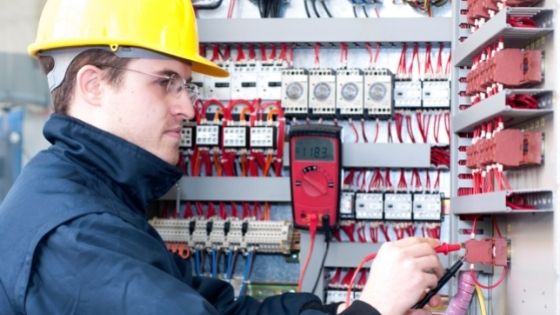An industrial electrician is responsible for all aspects of an industrial business, from the start-up of a new factory to the maintenance and repair of equipment, and everything in between. Industrial Electricians install, repair, and maintain all types of electrical equipment and components, including industrial control panels. This position usually requires extensive knowledge of industrial electrical safety codes and regulations, as well as understanding how various electrical devices and components interact with each other. A qualified industrial electrician must also be able to work in extreme conditions and be able to work with a variety of different people and machines.
As a part of the manufacturing industry, many factories rely on sophisticated and expensive machinery that is controlled by a single operator. For example, large electrical systems in the semiconductor processing plants use a series of complex wiring and control devices. Without the expertise of an industrial electrician, these plants would not function, as all of the circuitry is tightly controlled by just one person. The control panels themselves are operated by industrial electricians, who oversee the process of transmitting signals from one plant to another, or across the plant as a whole.
In addition to installing and repairing electrical equipment, industrial electricians are also required to read and interpret electrical codes and standards. All equipment that makes up an industrial plant must be properly wired and controlled, and all technical documents describing the equipment must be kept up to date. If these technical documents are poorly maintained, safety regulations could be easily violated, causing equipment malfunction and serious injury or damage to people or property. An industrial electrician must be skilled in both reading and interpreting technical documents, as well as being capable of following and interpreting these technical documents for their meaning and proper implementation.
Industrial Electricians also works in residential workplaces. They may be required to install and repair equipment in residential neighbourhoods, repairing appliances and wiring. This type of work environment is very different from what the Electrical Engineers would typically find working at a factory. Although both types of workers will typically be employed in office buildings, residential electricians often work with clients at night. They have more freedom to take more risks since there are more people at home.
Electrical contractor Bay Area provides residential neighbourhoods with electrical power. Many of these jobs require the installation and maintenance of the electrical wiring within the home. Domestic electricians work closely with the homeowner, sometimes calling on the help of other technicians or experts if certain wiring issues need to be addressed.
All industrial electricians must be skilled in both computer skills and verbal communications skills. Electrical blueprints, technical documents and correspondence can all be difficult to understand for someone who does not communicate well or has poor spelling and grammar. Since most electricians work directly with the homeowner, they must be able to effectively communicate with them using both verbal and written communication skills. These skill sets are necessary not only to create and obtain electrical blueprints and technical documents but also to make sure the job is complete and on schedule.
Communication is one of the main components that separate an excellent industrial electrician from one that works in residential settings. Electrical blueprints and technical documents are created and maintained in a variety of ways. In some cases, the electrician will meet with an individual or group of individuals before creating and communicating the plans and ideas for a particular set of wiring. Other times, an actual meeting will take place between the electrical engineers and homeowners in order to discuss the details of a job. The key is being able to clearly communicate all of the pertinent details of the blueprints and plans so that everyone involved is 100% on the same page.
While industrial electricians do not typically go to the home to perform their job, there are several instances where residential and domestic electricians collaborate and work side by side in a shared work environment. If you are an employer, consider pairing one individual with another to create a two-way communication system between your business and your employees. You may also work with a domestic electrician to complete the wiring and setup in the home. Whatever your needs, it is important to properly pair individuals with electricians in order to achieve your goals and the best results possible in terms of quality, safety, and reliability.




















